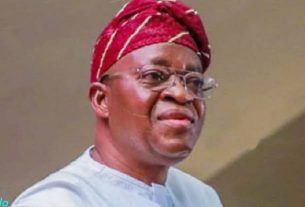Governor Ademola Adeleke
Osun State Government has called for a strategic partnership between the National Orientation Agency (NOA) and relevant government bodies to drive awareness and action on climate change.
Senior Special Assistant to the Governor of Osun State on Renewable Energy, Mr. Funmiso Babarinde, spoke at a landmark Climate Change Summit held in Osogbo on Tuesday, in Osogbo
He stressed the importance of collaborative efforts in addressing the growing threat of climate change, particularly at the community level.
The summit, organized by the Youth in Agroecology and Restoration Network in partnership with NET HOPE and Ushahidi (a Kenya-based civic tech organization), brought together representatives of community-based organizations, affiliated ministries, farmers, and local leaders in a bid to mainstream climate justice and renewable energy advocacy in Osun State.
Babarinde noted that the climate crisis is no longer an abstract or scientific theory, but a lived reality for many Nigerians, particularly farmers and low-income communities whose livelihoods are threatened by erratic weather patterns, flooding, and deforestation.
“We must act decisively and communicate in the language our people understand. Climate change is no longer a distant concept; it is here with us, affecting food production, health, infrastructure, and our very survival,” he said.
Highlighting some of the initiatives already taken by the Osun State Government to address climate-related challenges, Babarinde called for increased public awareness campaigns, policy alignment, and grassroots mobilization. He emphasized the critical role of the National Orientation Agency (NOA) in reaching remote and underserved communities with vital messages on climate responsibility.
“We are calling on the Director-General of the NOA to collaborate closely with the Federal Ministry of Information, State Ministries of Environment and Information, and media stakeholders to build a national framework for climate change advocacy,” Babarinde urged. “We must decentralize the message and make it culturally and linguistically accessible to all Nigerians.”
Babarinde also proposed that advocacy and educational content be produced in local languages such as Yoruba, Hausa, Igbo, and minority tongues to resonate with people at the grassroots. He underscored the power of storytelling and the need for entertainment industries—including Nollywood actors, musicians, and influencers—to be part of the campaign to amplify climate messages.
“The entertainment industry has a powerful influence on public perception. We must leverage this by engaging actors, musicians, comedians, and digital influencers to champion the climate cause in their content,” he said.
In a similar vein, he advocated for the training of journalists and content creators in specialized climate change reporting, arguing that the Nigerian media can only be effective in driving change if they are well-equipped with accurate knowledge and skills to cover environmental issues.
The summit itself was aimed at strengthening community capacity, co-creating locally relevant data-gathering tools, integrating local voices into climate policy, and promoting practical, community-led solutions to environmental challenges.
Participants at the event included youth leaders, climate activists, farmers’ associations, officials from the ministries of environment and agriculture, as well as traditional and religious leaders, many of whom expressed concern over the rapid degradation of their local environments and called for immediate and sustained government action.
In his closing remarks, Babarinde issued a passionate call to action:
“If we do not act together now, we may be risking a future where our children will no longer recognize this planet as home. Let us all be champions of climate responsibility. The time to act is not tomorrow—it is today.”
The event concluded with a resolution by stakeholders to form a Climate Action Network in Osun State, which will liaise with local authorities and monitor policy implementation while fostering education, reforestation, and sustainable agricultural practices.
As Nigeria and the global community brace for more extreme climate events, this initiative in Osun State is a shining example of how local governments and civil society can collaborate to protect the environment—one community at a time.





